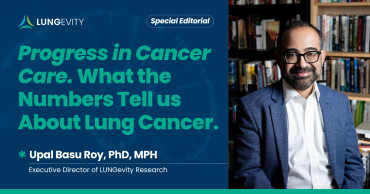Your Lung Cancer. Your Gateway.
Select the Patient Gateway for your biomarker or type of lung cancer to find specific information, resources, and news.
Do You Know Your Lung Cancer Type?
Your doctor has probably said you have either non-small cell lung cancer (NSCLC) or small cell lung cancer (SCLC). Some forms of NSCLC—which are only found through biomarker testing—have targeted drug treatments available.
If you have been diagnosed with NSCLC, talk with your doctor about comprehensive biomarker testing before starting any treatment plan.

Non-Small Cell Lung Cancer

Small Cell Lung Cancer

Lung Cancer Resources
What is Biomarker Testing?
Knowing your biomarker status directly impacts your treatment plan. If you have been diagnosed with NSCLC, be sure to ask your doctor about comprehensive biomarker testing. Learn more with these No One Missed resources.
Biomarker Basics Talking with Your Doctor All Biomarker Resources


Learn More at LUNGevity.org
The Patient Gateways share the latest news and information specific to your type of lung cancer. LUNGevity.org gives help beyond lung cancer—resources for care partners, weekly support groups, research breakthroughs, and more.




